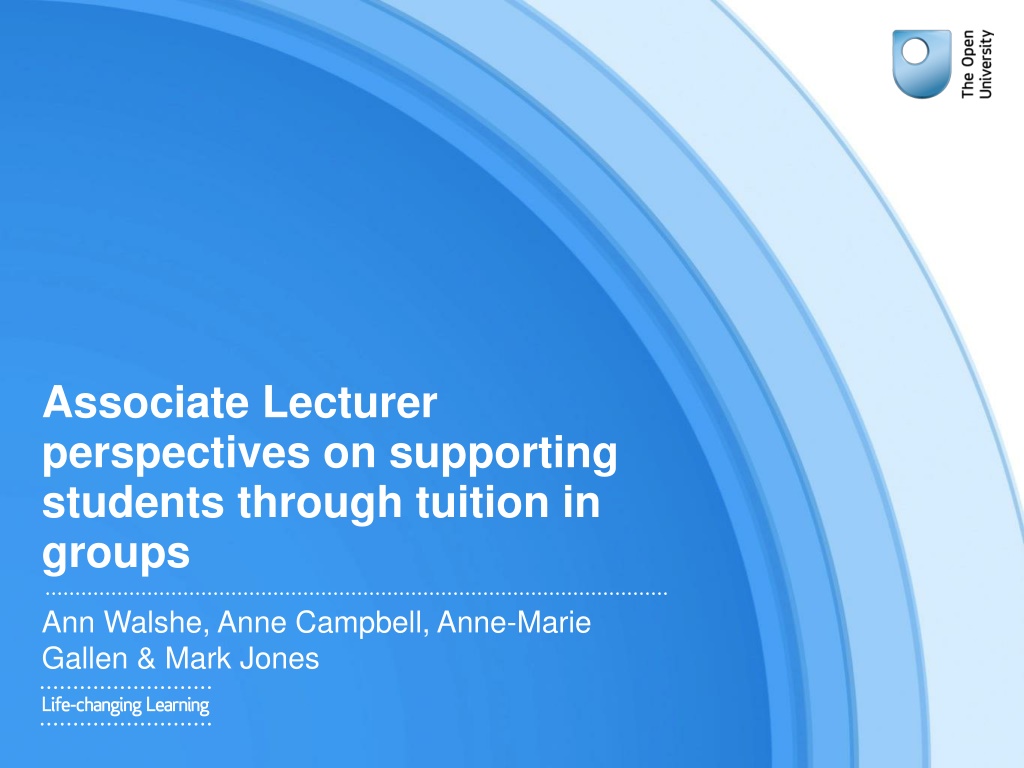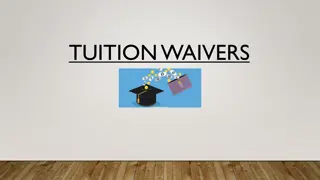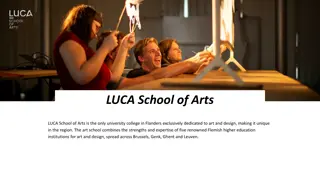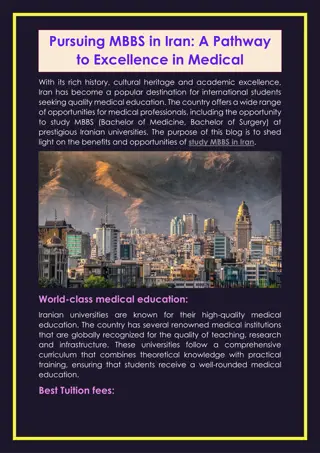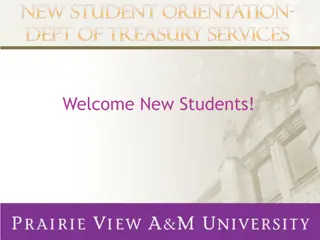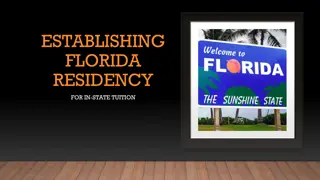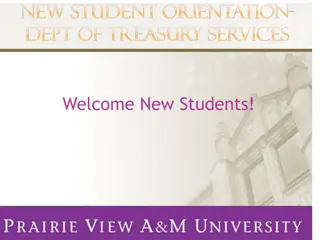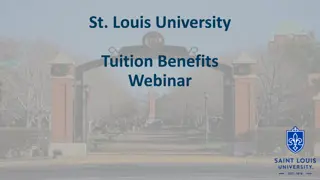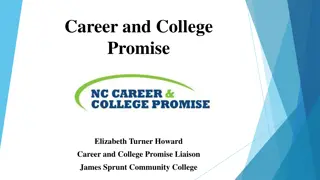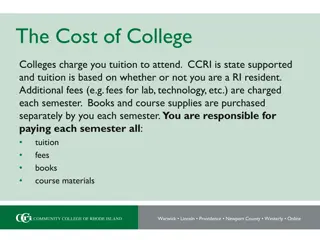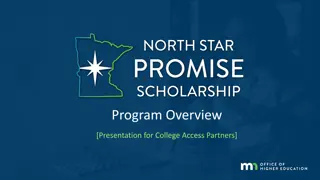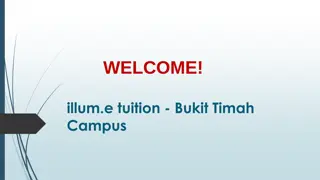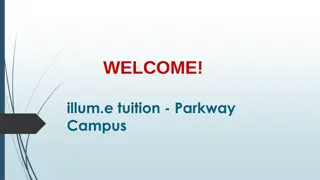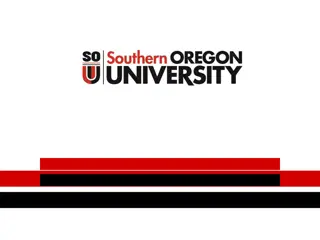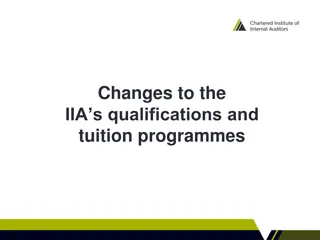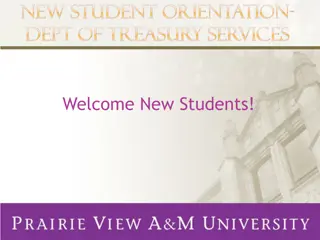Examining Associate Lecturer Perspectives on Supporting Students Through Group Tuition
This study delves into the perspectives of Associate Lecturers at the Open University regarding the role of tuition in supporting students in group settings. By investigating AL experiences, reflections, and perceptions, valuable insights are gained into student engagement, module team dynamics, and professional identity shaping. The study aims to enhance understanding of the significance of tuition in educational practices.
Download Presentation

Please find below an Image/Link to download the presentation.
The content on the website is provided AS IS for your information and personal use only. It may not be sold, licensed, or shared on other websites without obtaining consent from the author. Download presentation by click this link. If you encounter any issues during the download, it is possible that the publisher has removed the file from their server.
E N D
Presentation Transcript
Associate Lecturer perspectives on supporting students through tuition in groups Ann Walshe, Anne Campbell, Anne-Marie Gallen & Mark Jones
Background Do students know what tuition is for? Our starting point was to question whether students understand what tuition is for. This led to a wider question of whether there is a common understanding between all stakeholders about the role of tuition within the Open University Perceptions of tuition are of fundamental importance. For example: Student perception influences the level of participation in tutorials and tutorial activities, and whether student expectations are met. AL perceptions influence students, inform practice and help define professional identity. Module team perceptions are important in defining how tuition forms part of teaching strategies, and whether University-level expectations of tuition are realistic. What this study is not about While we are interested in tuition in groups, this study is not about the implementation of the Group Tuition Policy. 2
Associate Lecturer perspectives Drawing on experience and reflective practice This initial investigation focuses on Associate Lecturers. This is because they: o are experienced in delivering and reflecting on tuition, o have views on student and module team perceptions of tuition, o see the practice of delivering tuition in groups as part of their professional identity. Also, it is relatively straightforward to gather useful data from AL staff. Methodology A series of structured conversations with a cohort of Associate Lecturers from Science and MCT. A thematic analysis to identify aspects of perceptions of tuition that appear significant. The themes will provide pointers to direct our investigation of student and module team perceptions. 3
AL demographics Who did we speak to? Phone interviews with 19 ALs from MCT and Science Disciplines: Science (10), Engineering & Technology (6), Computing (5), Maths (4) All L1 tutors but most also with extensive experience of teaching at other levels Several teach across disciplines. Several teach across faculties. Based in locations right across England, Scotland and Wales, from large towns to remote areas Almost all with extensive external teaching experience 13 have taught or still teach in colleges and/or schools 7 have taught or still teach in other HE institutions 5 work in teaching & learning in other areas eg professional development, vocational training, basic literacy, prison teaching 4
Age and AL experience Who did we speak to? ALs who were already very interested in tuition Most of the ALs had many years of tuition experience in the OU and elsewhere Interviewed ALs: years as an AL Interviewed ALs: Age distribution 9 8 8 Number of years as an AL 7 7 6 6 Number of ALs 5 5 4 4 3 3 2 2 1 1 0 0 < 5 5 - 10 11 - 20 > 20 < 31 31 - 40 41 - 50 51 - 60 61 - 70 71 - 80 Years Age 5
OU Guidance on tuition What does TutorHome tell ALs? The purpose of tutorials varies according to faculty and module. Tutorials are a good opportunity for [students] to get help with key points, to gain confidence and meet other students. What does StudentHome tell students? Although we encourage students to attend tutorials this is completely optional. However, many students find that tutorials are a chance to have their questions and queries clarified, and that meeting other students helps their own studies. What does the Group Tuition Policy tell us? The main purpose of all group tuition is, in the broadest sense, the facilitation of learning. 6
OU Literature on tuition Atkins (2013) summarises existing research into tuition in the OU tuition design needs to be built into module production, including soft outcomes (building relationships etc) Goodfellow (2013) amongst other questions, students were asked to say what they believed the benefits of attendance at f2f and online tutorials to be a high percentage of students agree that the tutorials were helpful for understanding key concepts and ideas that they encountered in the module materials discusses the implications of the study for group tuition principles Goodfellow (2015) argues there is a need for module teams to engage with tutors 7
Relevant external literature Fung and Carr (2000) tutorials should be participatory events Garrison (2011) Community of Inquiry: social presence, cognitive presence and teaching presence Jeffs and Price (2009) importance of support in facilitating learning Macdonald and Campbell (2012): threshold concepts and troublesome knowledge Roodt (2013) defines a tutorial as a small-group learning environment peer learning Ogina and Mampane (2013) noticed divergent perceptions between students and tutors of the role of the tutor. A common understanding of the role of the tutor is crucial so that tutors and students will know what to expect in a tutorial session. 8
Emergent themes We will concentrate on a few perceptions and raise some questions about their implications within the context of how the university is working now and will be working in the future. 1. ALs see role as facilitator not teacher 2. Building student confidence and maintaining motivation 3. Social interaction/sharing 4. Threshold concepts 5. Developing skills 6. Collaboration/group work 7. Assessment 8. Challenging students intellectually 9. Looking ahead to being a professional 10.AL relationship with module teams & line managers 9
Emergent themes 1. ALs see role as facilitator not teacher 2. Building student confidence and maintaining motivation 3. Social interaction/sharing 4. Threshold concepts 5. Developing skills 6. Collaboration/group work 7. Assessment 8. Challenging students intellectually 9. Looking ahead to being a professional 10.AL relationship with module teams & line managers 10
Emergent themes 1. ALs see role as facilitator not teacher 2. Building student confidence and maintaining motivation 3. Social interaction/sharing 4. Threshold concepts 5. Developing skills 6. Collaboration/group work 7. Assessment 8. Challenging students intellectually 9. Looking ahead to being a professional 10.AL relationship with module teams & line managers 11
Emergent themes 1. ALs see role as facilitator not teacher 2. Building student confidence and maintaining motivation 3. Social interaction/sharing 4. Threshold concepts 5. Developing skills 6. Collaboration/group work 7. Assessment 8. Challenging students intellectually 9. Looking ahead to being a professional 10.AL relationship with module teams & line managers 12
Emergent themes 1. ALs see role as facilitator not teacher 2. Building student confidence and maintaining motivation 3. Social interaction/sharing 4. Threshold concepts 5. Developing skills 6. Collaboration/group work 7. Assessment 8. Challenging students intellectually 9. Looking ahead to being a professional 10.AL relationship with module teams & line managers 13
Emergent themes 1. ALs see role as facilitator not teacher 2. Building student confidence and maintaining motivation 3. Social interaction/sharing 4. Threshold concepts 5. Developing skills 6. Collaboration/group work 7. Assessment 8. Challenging students intellectually 9. Looking ahead to being a professional 10.AL relationship with module teams & line managers 14
AL as facilitator not teacher Guide on the Side not Sage on the Stage Image: Chris Sloan I soon got the belief in the OU that...our role is very much more to facilitate the learning, not to initiate the topics (C0) My role was for what I might call peripheral learning. To guide a student through the material rather than to teach them the material (S4) the important thing is to enable students to participate themselves and to think deeply about what they are doing allowing students to share ideas and knowledge (S4) quite a lot of what I am trying to do is getting students to do stuff for themselves. (D2) From my point of view to be able to help them with the concepts they are having difficulty with or skills they are having difficulty with. (N1) 15
AL as facilitator not teacher Online and how that changes things One thing students do a lot more now than they used to in the past is go to the internet. (N1) they now have a Facebook group (S0) they tend to ask their questions on the internet or forums (N1) students and their expectations have changed a lot due to technology improving a lot (S4) Students now want tutors to be more proactive in the forums more activities and participation (S4) 16
Social interaction/sharing A key purpose of group tuition We are trying to get them to have an opportunity to socialise with each other, gain some friends share ideas and expertise and mutually resolve issues. (D0) It seems to me that an early part of any group tutorial should be just generally a chit-chat about how things are going (C2) we decided to have a face to face tutorial ... right at the beginning of the course just so that I could meet students and they could meet with me, and they could meet each other. Because I felt it was important to give them a sense of inclusiveness and belonging, otherwise they would feel very much out on a limb (N1) the benefit with interaction with other students is to suddenly realise that they are not the only one in the world with that problem and of course that is a problem that can be shared [tutorials are] really good for the students socially when they meet other students it can really enliven them and invigorate them (D4) 17
Assessment The role of assessment in determining tutorial content How do tutors see the relationship between tutorials and assessment, and what do they think student expectations are? I spend a majority of time in tutorials on support for assignments because I think that is what the students want. (S2) although I don t want to make my sessions entirely assignment led I do bear that in mind quite strongly when I choose the topics I am going to go for. (C0) It would be a wonderful opportunity to give them a very rounded-off introduction to studying and to learning, to the module and to the pathway but they don t take this on. They want to have that TMA preparation and then they want to go home (S0) It is a major driver for content, but with some unease that it is such a dominant factor. 18
Assessment The role of assessment in determining tutorial content University guidance to tutors does not acknowledge the tutor experience: Most tutorials tend to concentrate on the academic content of the module, but you could also set aside time for group discussions of appropriate topics such as assignments, or revision and examinations. [our emphasis] (TutorHome, Tutorial planning and delivery) . 19
ALs and Module Teams Some of the statements made by ALs My module teams have never really shared what their views of group tuition are (S2) I don t know what the module team view is [on group tuition] to be honest with you (D1) I don t know the module team s views on group tuition...(D3) ...we do get quite a lot of information about what we want them to do and less on how to get them all to participate (N2) As far as staff tutors are concerned, I haven t a clue what their views on group tuition are (D3) 20
ALs and Module Teams There was also some concern that module teams might try to dictate what ALs should include in tutorials: ...I wouldn t necessarily appreciate too much in the way of guidance about what we should include because actually I am an experienced educator and I should be able to judge what my group needs at that point. (D2) ...what module teams want and what they think is good is worlds apart from what tutors think is good and what works, is practical and in the interests of the student. (S0) 21
ALs and Module Teams Need to work on the relationship between the line manager/Module team and the AL 22
ALs and Module Teams Need to work on the relationship between the line manager/Module team and the AL If we don t get the relationship right, how will we come to share common perceptions and have respect for each other s work 23
ALs and Module Teams Need to work on the relationship between the line manager/Module team and the AL If we don t get the relationship right, how will we come to share common perceptions and have respect for each other s work Module team should be wider, to include all teaching ALs 24
ALs and Module Teams Need to work on the relationship between the line manager/Module team and the AL If we don t get the relationship right, how will we come to share common perceptions and have respect for each other s work Module team should be wider, to include all teaching ALs ALs need a professional identity 25
Thoughts for the day: Is group tuition the only way to go? Will online as an alternative to f2f change things? How to create social presence online? How to maintain AL professional identity? 26
Contact details: @open.ac.uk ann.walshe anne.campbell anne-marie.gallen m.h.jones 27
